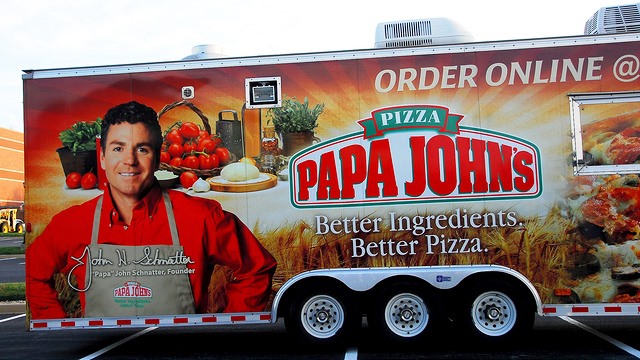
Image source: Mr. Blue MauMau via Flickr
Papa John’s recent PR crisis shows several PR crisis and reputation management lessons.
Papa John Chairman and founder John Schnatter resigned after using a racial slur during a conference call. It wasn’t his first experience with a PR scandal. Schnatter resigned as CEO last December after blaming poor sales on the NFL’s response to players who kneeled during the National Anthem. The divisive comments were poorly received, and he later apologized.
The problem for the pizza purveyor is that Schnatter’s face is tied to its image. His image appears on its signs, logo and pizza boxes.
When One Person Represents the Brand
The event shows that linking the brand’s image to one person creates risk. Subway learned that when its pitchman Jared Fogle was convicted of various sex-related crimes with minors. The sandwich company promptly terminated the relationship.
As CNN asked: How do you rebrand Papa John’s when the problem is Papa John? Some PR experts recommend an extensive PR and marketing campaign to completely rebrand the company, perhaps even change the name.
Others say customers will soon forget. Many don’t even know Schnatter’s name. “This too will pass,” 5W Public Relations CEO Ronn Torossian told CNN. “Clearly, he made a mistake and he should be held accountable, but in the long term, this will not be remembered.”
PR Lessons Learned
PR crisis management experts say the Papa John’s PR crisis offers these lessons.
Plan head. If your CEO or other person is the company’s public face, include the possibility of a personal scandal in PR crisis contingency plans. Schnatter’s face appears on the news release that announced his resignation, points out PR crisis management expert Gerard Braud.
“Did no one in marketing, branding, public relations, legal or any other department think, ‘Hey, we should take John Schnatter’s picture off of the news release that announces his resignation?’” Braud asks.
Prepare news releases. Every crisis communications plan should have a massive library of pre-written news releases. That library should include a pre-written news release for the CEO’s resignation. Prepare multiple-choice and fill-in-the-blank options, and have the legal team preapprove them, Braud says. Your clarity of thought in calm times is better than in the heat of a crisis. Papa John’s terse announcement of the resignation reveals a lack of planning. It lacks context, empathy or apology, all essentials for crisis communications.
Media monitoring. Companies generally use media monitoring tools to monitor traditional and social media for mentions of their company and product names. They may wish to also monitor mentions of top executives and celebrities pitching their products. Media monitoring may provide an early warning of a potential PR crisis.
There’s no such thing as off the record. Schnatter made the comment during a conference call with the company’s marketing agency, not at a public event or press conference. Ironically, the conference call was meant to prevent such scandal-causing comments.
PR experts recommend against speaking off the record to journalists. Reporters sometimes request information off the record then publish the information anyway. The Papa John’s incident shows that top executives must be judicious even when reporters are not within earshot.
Examine the corporate culture. Papa John’s can follow Starbucks’s example and supply franchisees and staff with sensitivity and leadership training, writes business consultant Carol Sankar, founder of The Confidence Factor for Women in Leadership.
“His remarks represent a culture that will not change just because he no longer has a seat on the board,” Sankar says. “Papa John’s needs to rebuild its trust and brand within the community. This is a public relations initiative that requires more than an apology.”
Bottom Line: The recent Papa John’s PR crisis demonstrates the danger of tying a brand’s PR and marketing to a single person. While companies can mitigate that risk through careful planning, the incident may cause organizations to hesitate before deciding to put all their marketing and PR plans in one basket.
William J. Comcowich founded and served as CEO of CyberAlert LLC, the predecessor of Glean.info. He is currently serving as Interim CEO and member of the Board of Directors. Glean.info provides customized media monitoring, media measurement and analytics solutions across all types of traditional and social media.




